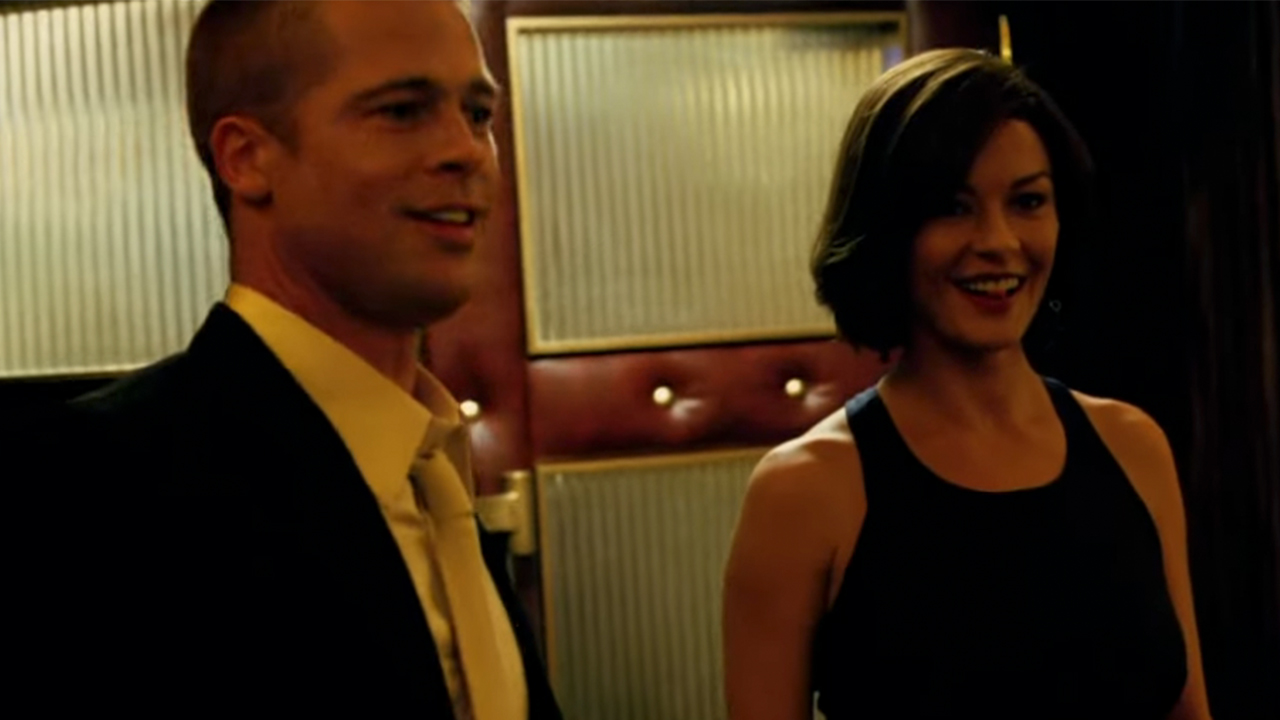TIFF Exclusive Interview: Max Winkler, Michael Angarano And Jake Johnson Of Ceremony

Film festivals are usually great places to catch searing dramas and documentaries, but good comedies are so rare that, when they arrive, everyone has no choice but to sit up and pay attention. That's exactly what happened here in Toronto after the premiere of Ceremony, the feature directing debut of Max Winkler that stars Michael Angarano as Sam, a pretentious young twentysomething deadest on crashing the wedding of the older woman (Uma Thurman) he's fallen hopelessly in love with.
Earning comparisons to Rushmore, or an indier, sweeter Wedding Crashers, Ceremony hasn't yet secured distribution, but I can guarantee you'll get a chance to see it one of these days. Earlier this week I sat down to talk to Winkler, Angarano and co-star Jake Johnson about their experience making the film together, which they shot on the northern shore of Long Island at an old mansion (where the entire cast and crew stayed for the duration of filming). They also explained to me how they captured the movie's raucous party scene (which apparently contains a secret Michael Cera cameo), what about Max's real-life inspired the script, and how Michael Angarano was constantly brought to tears by his character. Read all about it below.
The party scene in this movie looked really fun, and a little rougher and sillier than party scenes you usually see in films. How did you accomplish that?
Max: First it was one of our first night shoots, and it was toward the end of the movie so we had all become good friends, and we had a lot of fun. We shot it all in one night. Usually under most circumstances you'd have five days to shoot that. We were all running gun. No one was going back to their rooms. Everyone was staying and having fun and laughing. Mike Cera was there that night too. He's in the movie somewhere
Jake: We went to some restaurant where Michael and Reece [Thompson, who plays Sam's best friend] met some girl who was there, and all of a sudden they were like, "You should come!
Michael: Max invited her!
Jake:And she came!
Your Daily Blend of Entertainment News
Max: She's in the movie!
Jake: Nobody hooked up with her or anything, she was there. But it felt like an actual party.
Max: Uma had her dogs there. The dogs in the movie are her dogs. There was a real familial aspect to the whole thing. We had so much fun making it, which everyone says in these interviews, but we actually did.
Was it the kind of thing where you were all out there actually living in the house?
Max: We lived in the house. We lived in separate little beach houses on the property. I was in a twin bed right next to my assistant in a room the size of these two couches. Jake, Mike and Lee [Pace] were all in the same room.
Michael: It really became like a college dorm. Reece and I became very close in the movie-- we all became very close-- but the relationship you see onscreen between Reece and I… Literally I think we spent a day or two apart when filming this movie.
Max: You read to him before you went to sleep.
Michael: I did.
Was there an improv element to filming scenes like the party scene?
Max: Very much so. I keep saying this, but the most important part of directing is casting, and the rest of it is pretty easy. The biggest battles I put up were for casting. It was a very collaborative environment. We all had ideas, and it was sort of the best idea wins. We were all around set the whole time, because we had no home to go to.
Jake: But it wasn't a democracy. You could go in front of council, but Max was definitely the captain of it. What he would say would go. We were all allowed to give our input and feel in control of what we were doing, but there was always a guy driving the train.
Max: That said, the only thing I was ever truly concerned about was the story. So long as the characters were aware of where they needed to be emotionally at every place, it was fine. In the back of my mind where everyone needed to be at that particular point. It's really important to track, especially this guy [gestures to Michael], who is the true spark plug driving through the movie, to really know where he is at all times. To see the decline of him, the breakdown of him, his walls crashing down. Being this leading man that he believes he actually is, and in the end he's just a boy.

In the beginning of the movie I had a problem of not being able to stand Sam. How do you deal both with writing a character like that, and then playing him?
Michael: It was a lot of fun to play a character who is kind of reckless in how he chooses to treat people. It was not only Marshall, but basically, everybody in the script aside from Zee, Sam treats as though he's better than them.
Max: My hope is we can see from the start that the guy is clearly going through some kind of delusional period. I think the reason people are having such an incredible reaction to Michael in the press is because you know that he's faking it, because we cast somebody who's so clearly a good and light and innocent person. When you see this guy wearing an orange suit with a mustache and hair slicked back with Clark Gable you know that he's a faker. You see that when he finally faces Uma, and he looks at her and looks her up and down. All of that bullshit that we just saw for the first 9 minutes was just fake, just to get to her, and she completely undoes him.
And Michael you've got to deliver all his crazy lines at such a fast pace.
Michael: As far as the amount of dialogue, it was definitely a challenge at the end of the day just trying to get the lines out. It's not only the lines, it's the speed at which they're coming. I would be talking nonstop, rapid fire, and Max's directing would be even faster.
Max: Your character was really inspired by Billy Wilder movies, that type of comedy. I think there's a movement in comedy now-- and these comedies are some of my favorite comedies-- but things happen very slow and there's some looseness to them. There's a lot of dead space. It's not always necessarily story first, and for me it was always story first. We read through the Billy Wilder and I.A.L. Diamond scripts and just worshiped them.
Were there any in particular?
Max: I mean, Some Like It Hot-- two idiots on a vacation. We always made a joke that if this movie ever comes out in France it'll be called Two Idiots.
You've said that parts of this script were inspired by your own life. Which parts?
Max: It came from looking back at that time in your life where you believe you're the smartest person in the world, and you feel things that no one else can feel, and you have a better grasp on heartache than anyone else in the world. Everyone else in this interview has probably felt that way.
Michael: I can't talk about this movie without saying how cathartic an experience it is. Max gives all of us an opportunity to play the characters we were meant to play. [We got that] intangible feeling you have on a movie where you really feel it's going well.
Max:It was really clear to everyone on set that [Michael was] definitely going through a very emotional experience. Michael was literally crying in scenes he was not supposed to cry in.And you're not like that guy. You actually don't talk that much unless you're very comfortable. You're more like Marshall in that way. That's why you were originally cast as Marshall. [Jesse Eisenberg was originally cast as Sam] Everyone took their direction from Michael and the way he prepared for this character.
More Cinema Blend coverage from the 2010 Toronto International Film Festival right here.
Staff Writer at CinemaBlend

